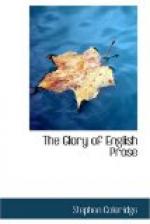mind like English; with words like pictures, with
words like the gossamer films of the summer; at
once the variety and picturesqueness of Homer;
the gloom and the intensity of AEschylus; not
compressed to the closest by Thucydides, nor fathomed
to the bottom by Plato; not sounding with all
its thunders, nor lit up with all its ardours
even under the Promethean touch of Demosthenes!
“And Latin—the voice of empire and of war, of law and of the state, inferior to its half-parent and rival in the embodying of passion and in the distinguishing of thought, but equal to it in sustaining the measured march of history; and superior to it in the indignant declamation of moral satire; stamped with the mark of an imperial and despotising republic; rigid in its construction, parsimonious in its synonyms; reluctantly yielding to the flowery yoke of Horace, although opening glimpses of Greek-like splendour in the occasional inspirations of Lucretius; proved indeed, to the uttermost, by Cicero, and by him found wanting; yet majestic in its bareness, impressive in its conciseness; the true language of history, instinct with the spirit of nations and not with the passions of individuals; breathing the maxims of the world, and not the tenets of the schools; one and uniform in its air and spirit, whether touched by the stern and haughty Sallust, by the open and discursive Livy, by the reserved and thoughtful Tacitus.
“These inestimable advantages, which no modern skill can wholly counterpoise, are known and felt by the scholar alone. He has not failed, in the sweet and silent studies of his youth, to drink deep at those sacred fountains of all that is just and beautiful in human language.
“The thoughts and the words of the master-spirits of Greece and of Rome, are inseparably blended in his memory; a sense of their marvellous harmonies, their exquisite fitness, their consummate polish, has sunk for ever in his heart, and thence throws out light and fragrancy upon the gloom and the annoyance of his maturer years. No avocations of professional labour will make him abandon their wholesome study; in the midst of a thousand cares he will find an hour to recur to his boyish lessons—to reperuse them in the pleasurable consciousness of old associations, and in the clearness of manly judgment, and to apply them to himself and to the world with superior profit.
“The more extended his sphere of learning in the literature of modern Europe, the more deeply, though the more wisely, will he reverence that of classical antiquity; and in declining age, when the appetite for magazines and reviews, and the ten-times repeated trash of the day, has failed, he will retire, as it were, within a circle of school-fellow friends, and end his secular studies as he began them, with his Homer, his Horace, and his Shakespeare.”
Ah, what an echo, Antony, every word of this beautiful passage finds in my own heart, only saddened with the poignant regret that the necessary business and occupation of the passing years have dulled for me such unpolished facility, as I may once have possessed, for perusing my Homer and my Horace!




